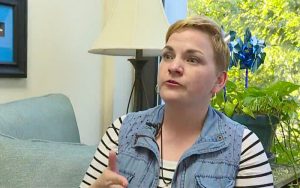Columbia, S.C. (WACH) – More and more scenes from Sunday’s tragic events in Las Vegas are hitting the airwaves and social media, and many experts are stressing the potential harm viewing them could do.

Amy Moseley, Children’s Trust of South Carolina. Watch video.
The images are bloody, the videos are deadly. But those who are witnessing the tragedy unfold from a secondhand standpoint are more than likely not realizing the mental and emotional toll it could be taking, especially children and teens. Blair Boozer with the National Federation of Families for Children’s Mental Health says her organization is having to face more and more the impact social media videos are having on youth. “One of the severe impacts of a child who sees these images is Post Traumatic Stress Disorder,” said Boozer. “Research shows that many children who are exposed to this sort of trauma early on, they can experience stress level akin to combat veterans.”Boozer emphasizes that, if adults are having a hard time viewing them, it is more likely double or triple that for developing children and teens. Even more alarming, she says the level of social media access has increased exponentially within the past decade, where most of the images from Sunday’s events are most likely to end up. She says it is very important for parents to be intimately aware of what is normal behavior for their respective little ones…and how they might change. The key is variation. However, Boozer says there are some common signs of trauma that can be looked out for as well. “They might be a little big clingier to you,” she said. “Their eating habits, their sleeping habits might change a little bit. They could become a little more agitated at school. Not wanting to leave your side.”Unfortunately, many experts say that children’s exposure to the harmful scenes is very difficult to monitor and that, most likely, they will see at least a few.
So, what can parents do?
Amy Moseley with the Children’s Trust of South Carolina says being proactive as well as reactive is key and it must start before a tragic event happens.”It’s really important for parents to understand that they need to have conversations with their kid proactively and ongoing talk about making good choices about what they’re accessing online and on TV,” said Moseley. Moseley, and other experts, stresses the following tips:
- Be open with your children. Let them know they can both trust you and talk to you about difficult subjects or things bothering them. Have set lunch or dinner times where you can sit down together, for example. Keep communication lines open.
- Help them realize that the Las Vegas massacre, although terrible, was an isolated incident and is not common.
- Ensure that they are safe. Though they see the frightened people running and scared, where they are currently is safe and secure and they will not be harmed.
- Emphasize that everything they hear will not be accurate. Teach them how to look for reputable sites and how to critically access the information they come across.
- Particularly for older children and teens, let them know that they have control of what they have exposure to, and that, just because a site or story can be accessed does not mean that it should. Teach them the importance of mental and emotional health.
- Bring in other professionals, such as child therapists, school counselors and faith leaders to help children and teens cope with potential fear and sadness they may have as a result of seeing a troubling video or picture, if necessary or if uneasiness persists.
- Lastly, and most importantly, since they will hear or see about the incident anyway, focus on the positive. Tell stories and show videos of the first responders, police, nurses and hospital personnel, good samaritans, and people giving blood. Give them hope through true stories of human bravery and goodness.
The following links include those of the agencies that could help children and teens cope with traumatic events, as well as informational sites how to speak with youth on troublesome events.
- How to Talk to Kids About the Las Vegas Shooting, Psychology Today
- How to Talk to Your Children About the Las Vegas Shooting, Save the Children
- Children’s Trust of South Carolina
- National Federation of Families for Children’s Mental Health, NFFCMH
Source: WACH-FOX





